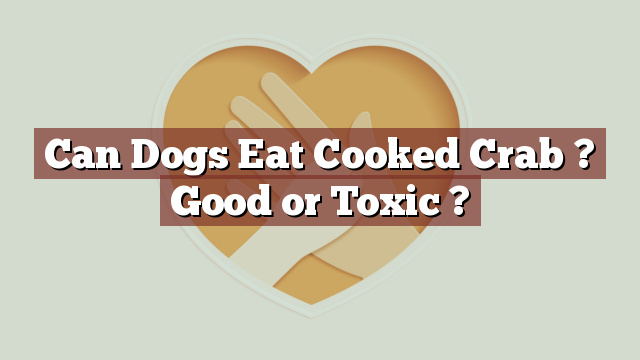Can Dogs Eat Cooked Crab? Good or Toxic?
It is important for pet owners to be knowledgeable about what foods are safe for their furry friends. While dogs have specific dietary needs, it is common for them to show interest in human foods, such as cooked crab. This leads us to question whether it is safe to share this delightful seafood with our canine companions. In this article, we will explore the nutritional value of cooked crab for dogs, whether it is safe or toxic for them, the potential risks and benefits of feeding it to dogs, what to do if your dog consumes cooked crab, and conclude with an overall recommendation.
Nutritional Value of Cooked Crab for Dogs
Crab meat is not only delicious but also packed with important nutrients. It is rich in protein, which is essential for a dog’s overall health and wellbeing. Protein helps to build and repair tissues, promote healthy skin and coat, and enhance the immune system. Additionally, cooked crab contains vitamins such as vitamin B12, which aids in the proper functioning of the nervous system, and minerals like zinc, copper, and selenium, which are vital for various bodily functions. However, it is worth noting that the exact nutritional composition of crab may vary depending on the specific type and preparation method.
Can Dogs Eat Cooked Crab? Is it Safe or Toxic?
Yes, dogs can eat cooked crab in moderation. While cooked crab is generally safe for dogs to consume, there are a few factors to consider. It is important to ensure that the crab is thoroughly cooked, free from any seasoning or additives, and served without the shell. The shell can pose a choking hazard and may also cause digestive issues if ingested. Furthermore, it is crucial to remove any small bones or cartilage that may be present in the crab meat, as these can also pose a choking risk.
Potential Risks and Benefits of Feeding Cooked Crab to Dogs
Feeding cooked crab to dogs can offer several health benefits. As mentioned earlier, it is a great source of protein, vitamins, and minerals. The protein in crab helps to support muscle growth and repair. The vitamins and minerals contribute to various bodily functions, including the immune system, cell growth, and energy production. Additionally, crab meat contains omega-3 fatty acids, which can promote heart health and reduce inflammation.
However, there are potential risks associated with feeding cooked crab to dogs. One concern is the high sodium content in some crab preparations, such as boiled or steamed crab. Excessive sodium consumption can lead to dehydration, increased thirst, and even sodium ion toxicity in dogs. It is crucial to serve cooked crab in moderation and avoid any seasoning that may contain excessive salt or harmful ingredients.
What to Do If Your Dog Eats Cooked Crab?
If your dog consumes cooked crab, follow these steps. First, assess the situation and determine how much crab your dog has eaten. If it was only a small amount, it is unlikely to cause any issues. However, if your dog has ingested a large quantity or if they start showing any signs of discomfort such as vomiting, diarrhea, or difficulty breathing, it is essential to contact your veterinarian immediately. They will be able to provide appropriate guidance and advice tailored to your dog’s specific situation.
Conclusion: Dogs Can Eat Cooked Crab in Moderation, but Caution is Advised
In conclusion, cooked crab can be a tasty and nutritious addition to a dog’s diet when served in moderation and under the right conditions. It provides valuable protein, vitamins, minerals, and omega-3 fatty acids. However, it is crucial to ensure that the crab is thoroughly cooked, free from seasonings or additives, and served without the shell. Additionally, any small bones or cartilage should be removed to avoid potential choking hazards. Excessive sodium content in some preparations should be avoided. As with introducing any new food to your dog’s diet, it is always best to consult with a veterinarian to ensure that it aligns with your dog’s specific dietary needs and health condition. By exercising caution and seeking professional advice when necessary, you can safely share the joy of cooked crab with your beloved canine companion.
Thank you for investing your time in exploring [page_title] on Can-Eat.org. Our goal is to provide readers like you with thorough and reliable information about various dietary topics. Each article, including [page_title], stems from diligent research and a passion for understanding the nuances of our food choices. We believe that knowledge is a vital step towards making informed and healthy decisions. However, while "[page_title]" sheds light on its specific topic, it's crucial to remember that everyone's body reacts differently to foods and dietary changes. What might be beneficial for one person could have different effects on another. Before you consider integrating suggestions or insights from "[page_title]" into your diet, it's always wise to consult with a nutritionist or healthcare professional. Their specialized knowledge ensures that you're making choices best suited to your individual health needs. As you navigate [page_title], be mindful of potential allergies, intolerances, or unique dietary requirements you may have. No singular article can capture the vast diversity of human health, and individualized guidance is invaluable. The content provided in [page_title] serves as a general guide. It is not, by any means, a substitute for personalized medical or nutritional advice. Your health should always be the top priority, and professional guidance is the best path forward. In your journey towards a balanced and nutritious lifestyle, we hope that [page_title] serves as a helpful stepping stone. Remember, informed decisions lead to healthier outcomes. Thank you for trusting Can-Eat.org. Continue exploring, learning, and prioritizing your health. Cheers to a well-informed and healthier future!

